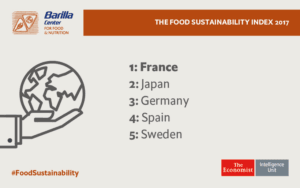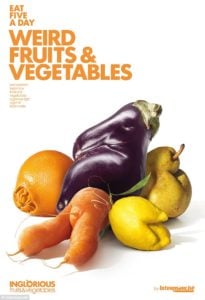
When we think of France we think of food but did you know in recent years, France has emerged at the forefront of the Food Waste Revolution, ranked number 1 by the Food Sustainability Index for their collective effort to reduce food waste. But the French are not resting still the country has set the ambitious target to cut its total food waste in half by 2025.
By far France is the world’s most famous culinary destination and for more than two centuries now, French chefs have been a highly valued export all over the world.
 Known for their special relationship and regard for food, unlike most of us, the French have not fallen out of sync with mindful food habits.
Known for their special relationship and regard for food, unlike most of us, the French have not fallen out of sync with mindful food habits.
Since 2012, France has been implementing an array of food policies and initiatives that have placed it on the frontline of the food waste revolution, proving once again, that when it comes to food there are no better people to learn from than the French. In the first part of our series dedicated to celebrating the French attitude to food, we look at how the country is leading the way in terms of public policies and initiatives. Yet, while the rest of us wait for our governments to develop food waste reduction policies, we can still join the Revolution, by starting doing things right now ourselves.
Back in 2012, France introduced the Waste Management Enforcement Law, which regulates the amount of organic waste sent to landfills, requiring private sector companies that produce more than 120 tons per year, to recycle their organic waste. Since, France has significantly lowered the tonnage requirements to 10 tons per year (which is less than 30 kilos per day), thus extending the law to include not only supermarkets and agricultural companies, but also almost the entire hospitality sector, with fines going up to €75,000.
In February 2016, France became the first country in the world to pass a law prohibiting large supermarkets from throwing away good quality food, approaching the “best before” date. Supermarkets with a footprint of 400 sq. metres (4,305 sq ft) or more will have to sign donation contracts with charities or face a penalty of €3,750 (£2,900).
 Prior to the law, most supermarket donation consisted of canned food. These days the quantity, quality, and diversity of donations have significantly increased. There are more fresh, nutritionally valuable foods like meat, vegetables, and fruits available further from their expiration date, which contributes to a richer, more balanced diet for the underprivileged.
Prior to the law, most supermarket donation consisted of canned food. These days the quantity, quality, and diversity of donations have significantly increased. There are more fresh, nutritionally valuable foods like meat, vegetables, and fruits available further from their expiration date, which contributes to a richer, more balanced diet for the underprivileged.
Essential to implementing that law is Banques Alimentaires a network of food banks delivering to 5,000 charities across France. The Bank now gets nearly half of its donations from grocery stores.
This policy is part of an ambitious proposal, for a national policy against food waste, “Fighting Food Waste: Proposals for a Public Policy,” released in April 2015, by French policymakers. It offers a broad scope of measures for prevention, recovery, and recycling of food produce. Other measures that have already been enacted, include the requirement for schools to teach students about food sustainability and companies to report food waste statistics in environmental reports. Another policy prescribes restaurants to make take-out bags available. There is also a ban on putting expiration dates on certain categories of goods, such as wine and vinegar. Further policies are still to follow. You can see the full list of the 36 proposed measures here.
However, the ambition to curb food waste in France is not limited to public policies only but is part of an esprit national to uphold a positive connection with food that is evident in the many public endeavours such as the biowaste initiative. In 2017, in a two-month-long recycling campaign launched in Paris, 3,200 food waste bins had been distributed to 120,000 residents in the capital’s 2nd and 12th arrondissements. Parisians were encouraged to recycle their biowaste, by putting their carrot peels, eggshells, and tea bags into a brown recycling bin instead of the ordinary bin.
 The private sector has also been active in food waste reduction. In 2014, Intermarche, France’s third-largest supermarket, was well ahead of the curve when it started selling “ugly” produce ― the fruits and vegetables that are fine to consume but may be misshapen or bruised. It purchased the produce that was previously discarded by growers, for falling short of the grocery’s industry “beauty standards”. Intermarche than created the “inglorious fruits and vegetables” section where the produce was sold 30 percent lower prices, than in the regular supermodels’ section. The supermarket chain came up with humorous names such as “the grotesque apple” and “the unfortunate clementine,” to engage consumers to sympathize with the ugly produce. Store traffic increased by 24 percent and the program reached 13 million people after one month.
The private sector has also been active in food waste reduction. In 2014, Intermarche, France’s third-largest supermarket, was well ahead of the curve when it started selling “ugly” produce ― the fruits and vegetables that are fine to consume but may be misshapen or bruised. It purchased the produce that was previously discarded by growers, for falling short of the grocery’s industry “beauty standards”. Intermarche than created the “inglorious fruits and vegetables” section where the produce was sold 30 percent lower prices, than in the regular supermodels’ section. The supermarket chain came up with humorous names such as “the grotesque apple” and “the unfortunate clementine,” to engage consumers to sympathize with the ugly produce. Store traffic increased by 24 percent and the program reached 13 million people after one month.
In their extensive review “Household food waste: drivers and potential intervention points for design”, Marie Hebrok and Casper Boks examine the top-down control of food waste practices, posing the question, of whether it is “possible to control consumer food waste practices through laws and regulations?”. They conclude that as of today, “this option is not particularly well explored. However, there are a few examples of governments attempting just that.”
Yet, France’s positive results described in the Food Sustainability Index Report provides a level of confidence that it is leading the way of the Food Waste Revolution.
Vivre la Révolution!


Comments are closed, but trackbacks and pingbacks are open.